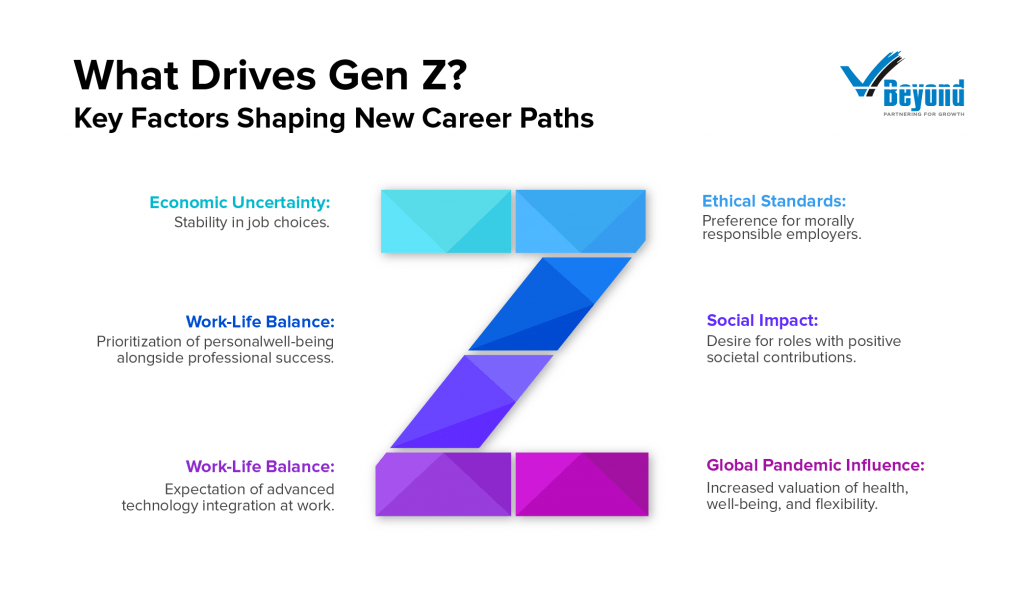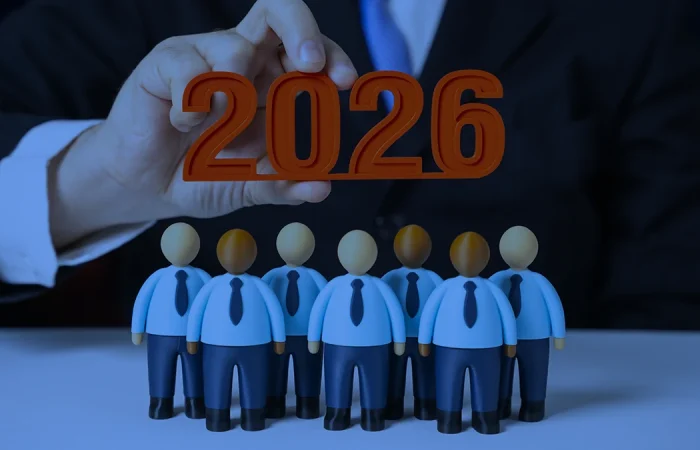Introduction
In a startling reversal, Google, once the dream destination for every aspiring tech guru, has slipped to a mere 7th place in the preferences of Gen Z, says an article in Business Insider. This shift signals a deeper transformation in the aspirations of a generation once synonymous with Silicon Valley’s glitter.
Why are tomorrow’s leaders trading tech giants for roles in healthcare and government? As Generation Z steps into the workforce, their career choices are reflecting a broader desire for roles that offer not only technological innovation but also tangible social impact and stability. This pivot away from traditional tech roles towards sectors with greater societal implications isn’t just a fleeting trend—it’s a profound shift that prompts a critical question for recruiters and business leaders alike: How do we adapt our recruitment strategy to align with the evolving values and aspirations of this new generation? Read the blog to learn more.
Decoding Gen Z’s Career Compass: From Tech Titans to Social Impact
As we witness a dynamic shift in career preferences among Gen Z workforce, it becomes evident that their aspirations extend far beyond the traditional allure of tech giants. Once revered destinations like Google, Amazon, and Tesla have seen significant drops in their rankings, falling to No. 7, No. 8, and No. 33, respectively. In stark contrast, there’s a burgeoning interest in diverse fields such as healthcare, government, and entrepreneurship, each offering unique appeals.
Why Big Tech Is Losing Its Shine for Gen Z Workforce
Despite their historical allure, tech companies are facing a decline in popularity among Gen Z due to high-profile layoffs, job insecurity, and ethical controversies.
As per insights gleaned from a survey among soon-to-be graduates, Catching up with the Class of 2024, there’s a palpable disillusionment with the tech industry’s promise, mirrored by a 19% drop in applications to tech companies from the class of 2024 compared to their predecessors two years prior.
Healthcare and Government: The New Frontiers for Gen Z
Healthcare and government roles are increasingly favored for their stability and societal impact. Institutions like St. Jude Children’s Research Hospital and the Mayo Clinic are top choices, alongside federal agencies such as the FBI, NASA, and the CDC. These roles offer not just job security but also a chance to contribute meaningfully to public welfare.
The Entrepreneurial Spirit: Gen Z’s Quest for Independence
A notable shift towards entrepreneurship marks Gen Z’s desire for independence and innovation. Many are interested in creating their own ventures, using traditional employment as a stable foundation while they explore entrepreneurial opportunities. This trend highlights their inclination towards self-direction and making a personal impact through their work.
What Drives Gen Z? Key Factors Shaping New Career Paths
Several key factors are shaping these preferences:
- Economic Uncertainty: The pursuit of stable, secure employment is paramount amidst global economic fluctuations, especially the upheaval in the tech sector.
- Ethical Standards: Gen Z places a premium on the ethical practices of potential employers, with a keen eye on corporate responsibility.
- Work-Life Balance: This generation values a balance between their professional achievements and personal well-being.
- Social Impact: There is a strong drive to engage in work that positively impacts society, whether through healthcare, public service, or sustainable business practices.
- Digital Fluency: As ‘digital natives’, Gen Z expects workplaces to harness technology effectively, enhancing their work rather than complicating it.
- Adulthood in a Global Pandemic: Experiencing formative years during the pandemic has heightened their value on health, well-being, and job flexibility.
These evolving preferences are prompting organizations across sectors to reassess their recruitment strategy and workplace cultures, ensuring they align with the values and expectations of this new generation entering the workforce.

Gen Z Recruitment Reimagined: Aligning Strategies with Their Values
To align with Gen Z career trends, sectors can adopt a talent acquisition strategy that emphasizes innovation, flexibility, and social responsibility. Here’s how various industries can purse Gen Z recruitment:
A. Leadership Collaboration: Crafting Roles for the Future
In response to the evolving job market and Gen Z’s unique career preferences, organizations can benefit from implementing leadership ideation sessions. These sessions would involve key company leaders and HR heads coming together to expand their understanding of emerging trends and expectations of the Gen Z workforce. Such collaborative forums could foster an environment of continuous learning and adaptability, essential for staying ahead in a rapidly changing workforce landscape. The outcome of these sessions could include the creation of new, permanent roles specifically designed to appeal to Gen Z talent, ensuring these roles not only align with the company’s long-term strategic goals but also offer the innovation and impact this generation seeks. Additionally, these gatherings can serve as a platform for leaders to refine their talent acquisition and management strategies, adapting traditional roles to incorporate elements like flexibility, technology integration, and social responsibility that are crucial for attracting and retaining young professionals.
B. Compensation Strategies for Gen Z: Beyond the Paycheck
- Equity Sharing and Ownership Opportunities: Startups and growth-focused companies can attract the Gen Z workforce with equity sharing or stock options. These offerings not only provide a sense of ownership and stake in the company’s success but could also lead to significant financial gains. Expanding this, firms might consider tiered equity programs, allowing employees to increase their stake as part of their compensation package.
- Dynamic Salary Adjustment Algorithms: Implement AI-driven systems to adjust salaries dynamically based on market data, company performance, and personal achievements. This method ensures competitive compensation, boosting job satisfaction and financial security.”
- Cryptocurrency as a Compensation Option: Offer a portion of salaries or bonuses in cryptocurrencies to cater to Gen Z’s interest in digital currencies and investment diversification.
- Crowdsourced Bonus Systems: Adopt peer-to-peer bonus systems where employees can award micro-bonuses to colleagues for their contributions, fostering a culture of appreciation and mutual recognition.
- Financial Milestone Grants: Support significant personal milestones through grants, such as ‘home purchase grants’ for first-time buyers or ‘educational advancement grants’ for further studies, enhancing employee loyalty and retention.
- Retirement Matching Plus Program: Go beyond standard 401(k) matching by introducing contributions to retirement funds based on employees’ community service or wellness activities, promoting a balanced lifestyle and long-term financial security.
- Flexible Earnings Access: Implement systems allowing employees early access to earned wages, helping manage unexpected expenses without resorting to high-interest loans.
- Sustainability-Linked Financial Incentives: Link financial incentives to sustainability goals, rewarding employees for reducing their carbon footprint or participating in corporate sustainability efforts.
By thus innovating their recruitment strategy, companies (including staffing and recruitment services) can significantly differentiate themselves in the job market, offering unique financial benefits that resonate deeply with Gen Z’s desires for flexibility, investment in their future, and participation in a broader economic ecosystem. These strategies not only attract this new wave of talent but also align company operations with futuristic and sustainable business practices.
C. Ethical Innovation: Driving Change with Integrity
Companies need to foster environments where innovation thrives within a framework of transparency and ethics, which appeals deeply to Gen Z’s values. For example, in sectors like healthcare, creating innovation labs that focus on ethical tech developments like e-health applications can set a company apart. These labs can host annual symposiums to showcase groundbreaking projects that directly enhance patient outcomes. Similarly, in sectors like environmental management, organizations can innovate in sustainable technologies and practices, aligning with Gen Z’s strong inclination towards environmental issues.
For public sectors and policy-driven organizations, implementing open government initiatives can be a game-changer. By using technology to make policy-making processes more transparent and engaging citizens in decision-making, governments can appeal to Gen Z’s desire for transparency and active participation in civic life. Such initiatives not only enhance operational transparency but also demonstrate a commitment to ethical governance, which resonates with Gen Z’s expectations.
D. Digital Engagement: Connecting Culture and Technology
To align with Gen Z career trends effectively, organizations should harness digital platforms not just for marketing, but for recruitment and engagement. Using platforms where Gen Z spends their time, like TikTok, Instagram, and YouTube, can help organizations present themselves as tech-savvy and culturally aware. For instance, museums or cultural institutions can use these platforms to showcase behind-the-scenes content or interactive tours, connecting with Gen Z on a medium they prefer and value. It’s all about incisive digital and cultural connectivity.
Emphasizing Diversity, Equity, and Inclusion (DEI) in all external communications and job postings can significantly boost an organization’s attractiveness to Gen Z. This generation prioritizes inclusive and diverse work environments. Industries like finance or law, traditionally perceived as conservative, can attract Gen Z talent by actively promoting their DEI initiatives and showing real-world impacts, such as funding scholarships for underrepresented groups or supporting legal reforms.
E. Impactful Work: Stories that Resonate with Gen Z Workforce
To genuinely connect with Gen Z’s desire to make a societal impact, organizations can leverage storytelling in powerful and relatable ways, which also enhances their employer reputation and branding. In the healthcare sector, for instance, rather than simply listing job benefits, companies can share detailed patient stories that highlight the emotional and physical recovery enabled by their staff. These narratives can be presented through various multimedia formats such as video diaries, interactive webinars with patients and staff, and real-time social media updates showing day-to-day progress in patient care. This approach not only underscores the meaningful nature of healthcare jobs but also strengthens the organization’s brand as a compassionate and impactful employer.
In the environmental sector, organizations can document case studies of successful conservation efforts, providing an insider view via mini-documentaries, blogs, or live-streamed panel discussions with environmental scientists. Sharing these stories highlights the company’s commitment to sustainability and social responsibility, which can attract Gen Z candidates who are passionate about making a difference. By showcasing the tangible impact of their work, companies can build a strong employer brand that resonates with Gen Z’s values, demonstrating that the organization offers more than just a job—it offers a chance to contribute to meaningful change.
Through these strategies, organizations can effectively communicate their impact on society, which is a crucial factor in enhancing their reputation and appealing to Gen Z. This not only attracts top talent but also fosters a sense of pride and loyalty among current employees, further solidifying the company’s position as a desirable place to work.
F. Customizing Careers: Personalized Paths for Gen Z Recruitment
Leverage cutting-edge technologies to tailor career development uniquely for each employee. For example, in healthcare, integrate machine learning algorithms that predict career trajectories based on a nurse’s or doctor’s interactions, skill progression, and patient outcomes. These predictions could guide personalized training programs in emerging fields like telemedicine or biotechnology. In education, utilize adaptive learning technologies to tailor professional development dynamically, based on educators’ teaching styles and student interaction patterns.
G. Adapting Workplaces: Aligned with Gen Z’s Evolving Aspirations
Adopt work models that redefine workplace flexibility. Introduce role-fluid environments where employees can shift between different roles or projects based on their skills and interests, enhancing engagement and satisfaction. Complement this with digital nomad policies that support working from various global locations, provided they align with organizational goals and time zones.
Develop comprehensive wellness programs that integrate physical, mental, and emotional health. Use AI-driven health platforms that personalize wellness plans based on biometric data and lifestyle choices of employees. Include features like AI wellness coaches, virtual reality relaxation spaces, and gamified health challenges to encourage participation and make wellness an engaging part of the company culture.
Strategic Adaptations by Staffing & Recruitment Services: Responding to Gen Z Career Trends (Shifting Expectations) Across Industries
Staffing and recruitment services firms possess a unique, firsthand understanding of generational shifts in the workforce, making them adept at navigating and addressing the evolving preferences of Generation Z. Their deep insight into the nuances of different generational expectations positions them as invaluable partners in modernizing recruitment practices across non-tech sectors such as healthcare and government.
By integrating smart contract employment agreements through blockchain technology, these agencies ensure unparalleled transparency and efficiency, directly appealing to Gen Z’s demand for clarity and accountability. Additionally, they leverage IoT devices and big data analytics to maintain dynamic talent pools, enabling real-time updates of candidate profiles and allowing sectors like healthcare and government to rapidly adapt to fluctuating staffing needs.
Moreover, these providers revolutionize the recruitment experience by incorporating gamified elements into the Gen Z hiring process. This approach not only engages candidates but also effectively evaluates critical skills such as ethical judgment, teamwork, and problem-solving under pressure—skills essential in high-stakes environments. Furthermore, these agencies lead in promoting eco-conscious recruitment practices, aligning all processes with sustainable principles, which resonate deeply with Gen Z’s environmental values.
Staffing and recruitment services agencies also collaborate with academic institutions and industry leaders to forecast future skill requirements (including future leadership skills), preparing the workforce for both current challenges and future advancements. This proactive strategy ensures that sectors like healthcare and government remain at the forefront of technological and administrative evolution.
Through these comprehensive and innovative approaches, staffing and recruitment services firms ensure that organizations can attract and retain a motivated, adaptable, and ethically engaged workforce, perfectly aligned with Gen Z career trends and their shifting expectations. This alignment not only meets the immediate needs of today’s job market but also builds a resilient foundation for future growth and success.
Conclusion
The Gen Z workforce, once the champions of the flexibility and innovation offered by the gig economy and tech sectors, is now confronting the reality of job insecurity and the rapid pace of technological change. These challenges are prompting a significant reassessment of their career priorities, driving many towards fields like healthcare and government, which not only promise greater stability but also provide meaningful societal impact.
The shift away from Silicon Valley could herald a significant redistribution of talent across various sectors. While the tech industry has long attracted a disproportionate share of innovative minds, its diminishing allure might now enable other sectors to attract and cultivate the bright young talents who are eager to drive change.
As of now, it is challenging to predict definitively whether the shift in Gen Z preference will benefit the economy overall, and to what extent. The potential adverse impact on the gigantic technology sector and its implications thereof cannot be ignored either. However, a more diverse spread of talent across multiple sectors could mitigate the risks associated with the concentration of talent in a few high-tech companies; it could also enhance the capacity for innovation across the board, ensuring that more sectors can contribute effectively to solving pressing global challenges.
Ready to adapt your recruitment strategy to meet Gen Z’s expectations? Connect with us to transform how you attract tomorrow’s leaders.


